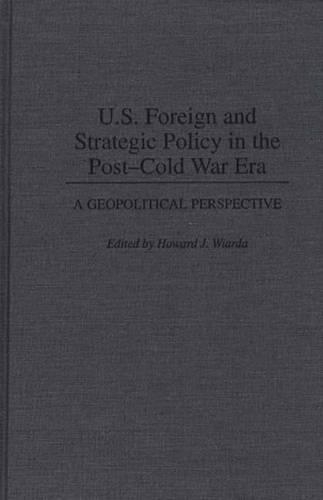
U.S. Foreign and Strategic Policy in the Post-Cold War Era: A Geopolitical Perspective
(Hardback)
Publishing Details
U.S. Foreign and Strategic Policy in the Post-Cold War Era: A Geopolitical Perspective
By (Author) Howard J. Wiarda
Bloomsbury Publishing PLC
Praeger Publishers Inc
20th November 1995
United States
Classifications
Tertiary Education
Non Fiction
Military and defence strategy
Central / national / federal government policies
Political geography
327.73
Physical Properties
Hardback
272
Description
Since the end of the Cold War, there has been a great deal of debate about what U.S. foreign policy should be and how priorities should be reordered. This comprehensive, well-written, provocative assessment has set out to provide answers to key questions. Written by leading experts on their respective regions, who also are professors of national security policy at the National War College in Washington, D.C., this book charts a path for post-Cold War U.S. foreign policy. Each chapter follows a common framework and research design and is informed by a team teaching method, as well as by long experience in policymaking and in academic institutions. The survey consists of chapters dealing with each of the major geopolitical regions of the world and asks a set of common questions: What are the dynamic changes that have occurred in the region How have security and foreign policy issues changed since the Cold War What is the history of U.S. policy in the region How must U.S. policy change to adjust to new realities An introduction and conclusion point to issues of comparison and sum up conclusions reached by the different contributors. This short overview is intended for courses in U.S. foreign policy and world affairs and for the use of upper-level undergraduate and graduate students, teachers, policymakers, and general readers in political science, world history, and military studies.
Author Bio
HOWARD J. WIARDA is Professor of National Security Policy at the National War College, Professor of Political Science at the University of Massachusetts at Amherst (on leave), and Senior Associate at the Center for Strategic and International Studies (CSIS). Wiarda most recently authored American Foreign Policy, Politics in Iberia, The Democratic Revolution, and Introduction to Comparative Politics. A member of the Council on Foreign Relations, he also served as lead consultant to the National Bipartisan (Kissinger) Commission on Central America, as a member of a presidential task force on foreign assistance, and as an advisor to several government agencies and presidents.
